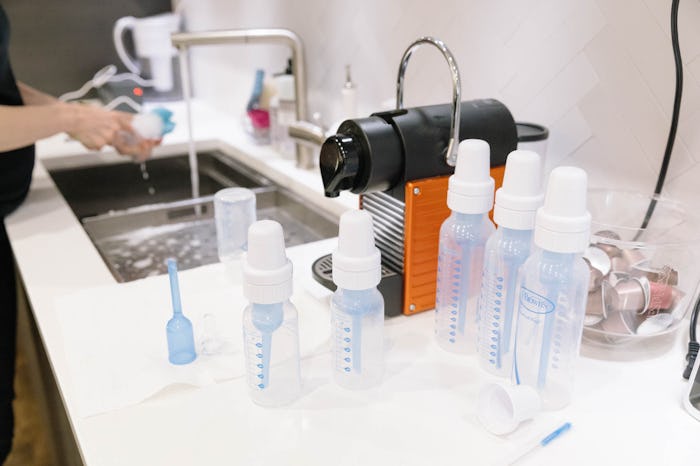Life
It Sounds Convenient, But Here's Why Leaving Your Bottle Warmer On All Night Isn't OK
I'm strangely attached to my bottle warmer, despite the fact that I don't like it all that much. Picture this: it's the middle of the night, and your toddler is up and fussing. You stumble into the night kitchen and stub your toe on the cat dish. You fill a bottle with refrigerated milk, and grope for the button on your bottle warmer. Then you wait. And wait. And wait. Years pass. Your toddler is now a teenager, and the milk is still cold. But is leaving a bottle warmer on all night safe so you can skip the lengthy pre-heating process entirely?
Most bottle warmers heat a small amount of water in a tank to create a warming steam. Others use a gently heated water bath. Essentially, whether or not you can leave a product on all night depends on which brand you own, and there are tons. Patty Davis of the Consumer Product Safety Commission (CPSC) tells Romper in an interview that you should first go with whatever the manufacturer advises in their manual. For instance, the Cuisinart Baby Bottle Warmer instructs parents to unplug it when not in use, and the Phillips Avent Bottle Warmer warns users not to preheat it. But not every bottle warmer user's guide provides clear instructions, and forums are buzzing with questions about late-night feedings.
Tellingly, the highes -rated and most technologically advanced bottle warmers on the market — the Kiinde Kozii Bottle Warmer and Breast Milk Warmer consistently comes out on top — provide an auto shut-off feature. That means the warmer can't be left on overnight, and can't overheat. (Your Best Pick called the Kiinde Kozii the "best you can buy.") Personally, I advise caution with all these devices, simply because generally speaking, they're fairly cheap appliances made of plastic. And they're not like Crock-Pots, designed for slow-cooking use. With steam heaters that don't have an automatic shut-off, there's a risk that the water in the tank will evaporate, leaving the plastic to scale or burn.
Of course, defective bottle warmers are a fire hazard any time of day. In 2016, about 255,000 Tommee Tippee electric bottle warmers were recalled for "overheating, melting, smoking and catching on fire." In all, consumers reported $16,000 dollars worth of property damage, according to the CPSC. Luckily, no one was hurt, but it's easy to imagine a situation in which these relatively inexpensive devices cause a more serious problem. In 2008, 5,000 Munchkin Deluxe Bottle and Food Warmers were also recalled for overheating.
"If you have a recalled bottle warmer, make sure that you contact the company and take advantage of the remedy," advises Davis, as companies will repair or replace potentially hazardous products. You can also check out the CPSC's reporting site, saferproducts.gov. "You can look up your specific product, and see if other people are reporting safety concerns with it," Davis says.
Additionally, electrical fires are always a risk when appliances are old or broken, or if the electrical cord frays. So it's important to make sure your warmer is in good working order. Beyond that, don't leave your bottle on at night unless your user's manual expressly says it's safe.
While electric bottle warmers can make your life a smidge easier, the truth is that they don't actually warm a bottle any quicker than running it under tap water, according to Parenting Reviewed, which conducts nearly scientific product investigations. (Reviewed did note, however, that the tap water method feels longer, probably for the same reasons that watching water boils feels eternal.) A humble suggestion: instead of tapping your foot at midnight while the baby cries and your bottle warmer heats to the right temperature, why not heat some water before you go to bed and store it in a thermos? Leaving an electric bottle warmer on overnight, while convenient-sounding, just isn't worth the risk.
Check out Romper's new video series, Bearing The Motherload, where disagreeing parents from different sides of an issue sit down with a mediator and talk about how to support (and not judge) each other’s parenting perspectives. New episodes air Mondays on Facebook.
